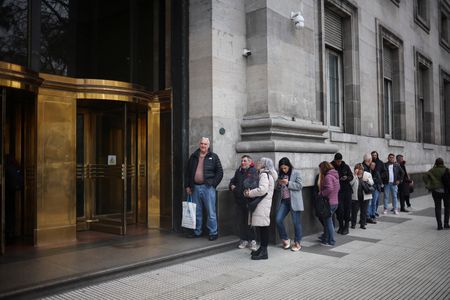By Rodrigo Campos and Karin Strohecker
NEW YORK/LONDON (Reuters) - Argentina's markets tumbled on Monday, with the peso currency touching a historic low, after a heavy defeat for President Javier Milei's party at the hands of the Peronist opposition in local elections stoked worries about the government's ability to implement its economic reform agenda.
The peso lost as much as 5.6% to the dollar and ended the session down 3.1% at 1,407 per greenback while the local stock index benchmark fell 13%, and an index of Argentine stocks traded on U.S. exchanges lost 18%. Some of the country's international bonds saw their biggest daily price falls since they began trading in 2020 after a $65 billion restructuring deal.
The 13-point victory for the Peronists signalled a tough battle for Milei in national midterm elections on October 26, where his party is aiming to secure enough seats to avoid overrides to his presidential vetoes.
"The markets are now more pressured in the aftermath, and it certainly does have implications and some degree of read-through for the October vote," said Kathryn Exum, co-head of sovereign research at Gramercy, adding it was a reminder to investors that Peronism - with its heavy-handed state involvement in the economy - was not yet dead.
"The bigger question is what happens post midterms and how committed they remain to policy, how much further they're able to go, (given) the political context that they have been afforded," she said, referring to the government.
The government setback at the polls adds to recent headwinds for a market that had until recently outperformed its Latin American peers.
The International Monetary Fund approved a $20 billion program in April, of which some $15 billion have already been disbursed. The IMF, which has eagerly backed the reform program of Milei's government, did not respond to questions on whether the vote result would change its relationship with the Milei administration or alter the program.
The bond market selloff saw the country's 2030 issue fall 5.875 cents, on track for its largest daily drop since its post-restructuring issuance in 2020.
Morgan Stanley had warned ahead of the vote that the international bonds could fall up to 10 points if a Milei drubbing dented his agenda for radical reform. On Monday, the bank pulled its 'like' stance on the bonds that was placed just days ago.
The gap in the Buenos Aires Province (PBA) election in favor of the opposition Peronists was much wider than polls anticipated and what the market had priced in. Based on official counts, the Peronists won 47.3% of the vote across the province, while the candidate of Milei's party took 33.7%.
"We had our reservations about the market being too complacent regarding the Buenos Aires election results. The foreign exchange market will undoubtedly be under the spotlight, as any instability there can have a ripple effect on Argentine assets," said Shamaila Khan, head of fixed income for emerging markets and Asia Pacific at UBS.
"The midterm elections," she added, "carry more weight and their outcome will significantly influence how Argentine assets perform in the coming months."
MARKET SELLOFF
Argentina - one of the big reform stories across emerging markets since Milei became president in December 2023 - has seen its markets come under heavy pressure over the last month following a corruption scandal involving Milei's sister and political gatekeeper Karina Milei.
Argentina's main equity index has dropped around 20%, its international government bonds have sold off and pressure on the recently unpegged peso forced authorities to start intervening in the FX market.
The government now faces the difficult choice whether to allow the peso to depreciate ahead of next month's midterms or spend more of its foreign exchange reserves to intervene in the FX market, according to Pramol Dhawan, head of EM portfolio management at Pimco.
"Opting for intervention would likely prove counterproductive, as it risks derailing the IMF program and diminishing the country’s prospects for future market access to refinance external debt," Dhawan said via email.
"The more resources the government allocates to defending the currency, the fewer will be available to meet obligations to bondholders - thereby increasing the risk of default."
Barclays analyst Ivan Stambulsky pointed to comments from Economy Minister Luis Caputo on Sunday that the country's FX regime will not change.
"We’re likely to see strong pressure on the FX and declining reserves as the Ministry of Economy intervenes," Stambulsky said. "If FX sales persist, markets will likely start wondering what will happen if the economic team is forced to let the currency depreciate before the October mid-terms."
Some analysts predicted other parts of the country were unlikely to vote as strongly against Milei as Buenos Aires province did, given it is a traditional Peronist stronghold.
They also expected the Milei government to stick to its programme of fiscal discipline despite economic woes.
"The policy mix adopted in the coming days and weeks to address elevated political risk will be pivotal in shaping medium-term inflation expectations - and, ultimately, the success of the stabilization program," said JPMorgan in a Sunday client note.
(Reporting by Karin Strohecker and Rodrigo Campos, additional reporting by Marc Jones and Shashwat Chauhan, editing by Alistair Bell, Marguerita Choy and Nia Williams)











